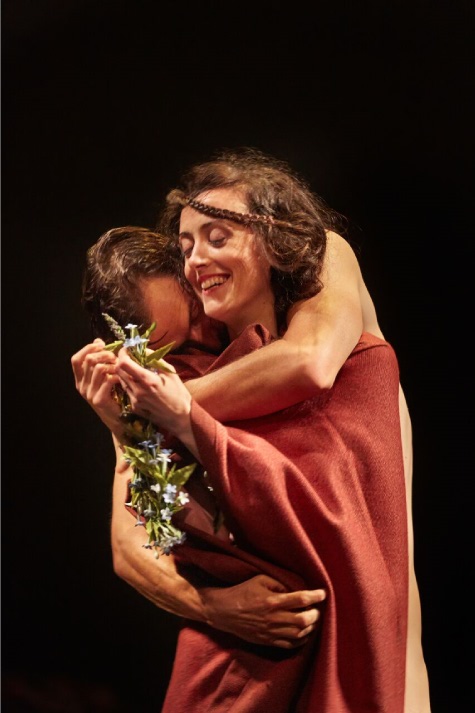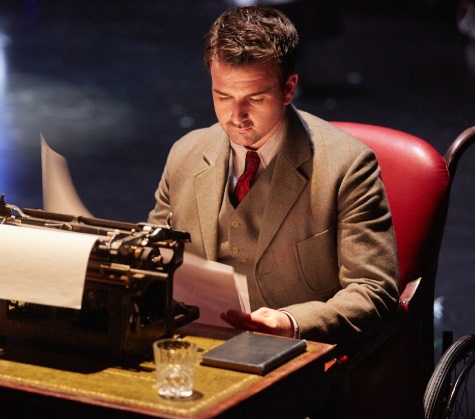|
 Lady
Chatterley’s Lover Lady
Chatterley’s Lover
Malvern Theatres
****
SIR CLIFFORD Chatterley returns from the
First World War disabled and impotent. He can no longer meet all the
needs of his young wife.
This sets up quite unbearable strains on their
relationship and their sense of purpose and future in life.
Hedydd Dylan as Lady Chatterley
and Jonah Russell as the gamekeeper Mellors
Lady Chatterley has become more a carer for her
young aristocratic husband than a love mate.
It adds to the strain that her husband would like
her to bear a child for him by having superficial sex with another man.
It is out of this profound sexual frustration and the lack of meaningful
love between them that Lady Chatterley seeks a mate in the form of the
gamekeeper on their estate, Mellors. Their relationship develops out of
their physical frustration more than any friendship or romance.
These two individuals are lost souls in a
fragmented and disintegrated world: the impact of a devastating war has
undermined religious faith and traditional values for many, it left deep
tensions between social classes and accelerated the aspirations of women
in society and within marriage.
Lady Chatterley and Mellors are seeking some
integration and fulfilment in their sexual passion, but it provides only
passing and temporary relief rather than lasting satisfaction.
When their illicit relationship comes to the
attention of the local villagers, they are confronted with social
pressures that strain them to breaking point. It all ends in a torturous
cry of despair.
Mellors is leaving for Sheffield to
undertake a new labouring job in the steel industry and Lady Chatterley
is facing a bleak and despairing future though she is expecting his
child. Her final cry – ‘Will you come back for me if I can’t bear it any
more?’ epitomises the tragedy of this story.
DH Lawrence manages to address other themes than
the role of sexual love in his novel. We see the arrogance of the upper
and privileged classes and the exploitation of the workers. The
liberation of women, the perceived restrictions of marriage and the
overall angst of life are all presented through the tensions in the
relationships in this play.
This dramatisation is brilliantly realised with a
stylised and visually striking production. The early very short staccato
scenes serve as a metaphor for the fragmentation of the world and have a
sharp dramatic, impressionistic impact.
There is a coldness in the design as well as in
the relationships from the outset. The home of the Chatterleys is like an icebox with all the
furniture covered in white shrouds.
the outset. The home of the Chatterleys is like an icebox with all the
furniture covered in white shrouds.
The use of lighting and the effective use of the
gauze, the simple but effective deployment of a few items of furniture
and props, all contribute to the dramatic and tense atmosphere that is
sustained throughout almost the entire evening.
Eugene O’Hare as Sir Clifford Chatterley
The depiction of their sexual relationship and
their frequent love-making is mostly very natural, but tortured and
anguished.
Some might find the amount of nudity difficult
but it serves to explore DH Lawrence’s sense of the importance of
physicality and sexual love in the human desire for integration and
fulfilment.
They do achieve a degree of ‘tenderness’ at times, the original title
for the novel, but it is always tinged with tension and angst.
The performances by the cast are very strong.
Eugene O’Hare (Sir Clifford Chatterley) communicates powerfully the rage
and frustration of the disabled veteran, the arrogance of the landowning
aristocracy and their brutal lack of sympathy with his workers.
Hedydd Dylan (Lady Chatterley) communicates her
frustration, her lostness and angst with great intensity and drives the
relationship with Mellors from her position of social superiority. She
has an excellent voice to invite our empathy.
Jonah Russell (Mellors) has the appropriate
sullen but physical rawness to attract his mistress, but you never feel
that he believes this relationship can be sustained in the context of a
very conservative culture.
These three principals are supported by a strong
ensemble team who all contribute to this stylised, cold and anguished
production.
As with Strindberg’s
Miss Julie,
the frustrated and privileged woman luring the servant into a sexual
relationship results in more tension and disconnection than she escapes.
But we are left to feel deep empathy for her and her complete lostness
and despair in DH Lawrence’s angry, unjust and painful world. Despite
being somewhat over-long, it is a very gut-wrenching and sad story,
performed with great passion and skill with a very powerful visual
impact. To 05-11-16
Tim Crow
01-11-16
|

